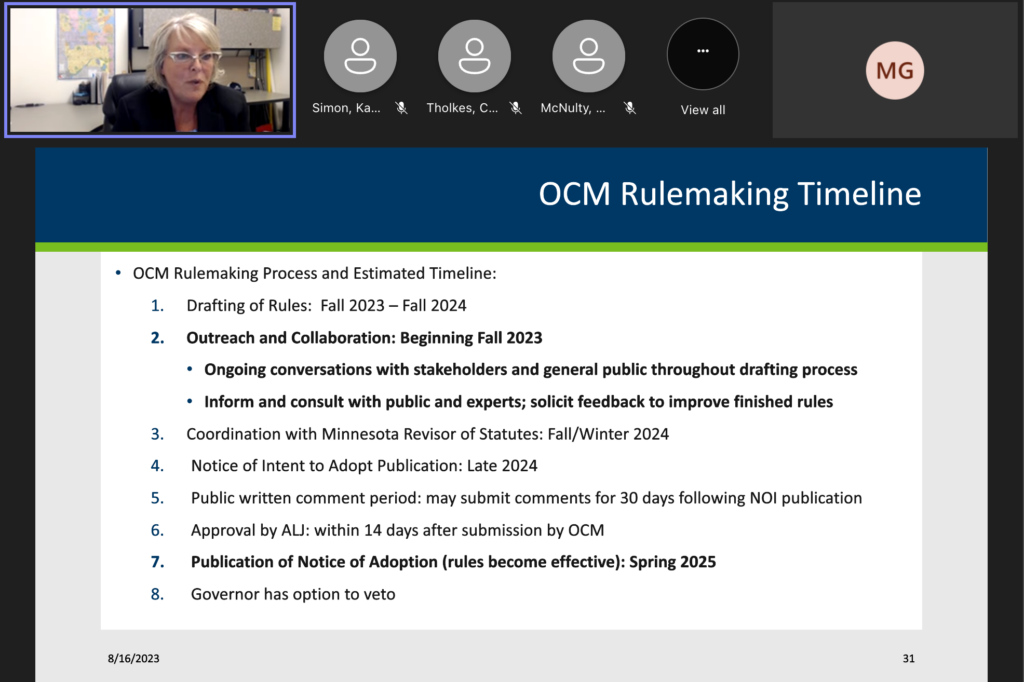Minnesota officials outlined the long, labyrinthine process for implementing the state’s new marijuana law during an informational meeting on Wednesday night, offering updates on the search for an Office of Cannabis Management (OCM) director as well as the array of issues still to be hammered out through an expedited rulemaking process.
“This is really a unique opportunity for us to assess the business needs, to evaluate the authorities that the legislature and the governor have given to the Office of Cannabis Management and then to meet those business needs in a way that really helps us ensure the success of the cannabis industry in Minnesota,” Charlene Briner, OCM’s implementation director, said at the meeting.
Minnesota Office of Cannabis Management
Gov. Tim Walz (D) signed the state’s new legalization law in May, and it took effect earlier this month. But while possession and home cultivation of cannabis by adults is now legal in the state, officials expect that it will still be nearly two years before state-licensed retailers open.
In the meantime, there are still a series of hoops to jump through for both regulators and would-be businesses. That includes setting up OCM governance, public outreach and crafting a bevy of new rules to guide the new industry. “This is really an all-hands-on-deck endeavor,” Briner said.
One of the first steps is selecting someone to lead OCM. Briner is heading the governor’s search for top cannabis regulator candidates and expects to submit a list of finalists to Walz’s office later this month, she said. The governor anticipates announcing the new director in early September.
After a director is hired, the state will fill a 51-member Cannabis Advisory Council with various stakeholders, including representatives from public health, the cannabis industry, the medical marijuana community and others. Dozens of open council positions have already been posted online, and Briner encouraged anyone interested to apply sooner rather than later. Selections are expected to be announced sometime this fall.
As for rulemaking, Briner said the state wants to collect as much information as possible and, in turn, provide a measure of transparency in the process. “There is a tremendous hunger for information about what this will look like, about how we’re going to go about rulemaking,” she said. “We’re trying to be very proactive, as much as possible, to provide external communications.”
OCM’s website, which launched even before the governor signed the legalization bill, is being updated regularly with new information, Briner added, including details about rulemaking as well as for people interested in starting marijuana-related businesses.
Minnesota’s hemp and medical marijuana programs will, for now, remain the same from a regulatory oversight perspective, Briner said. But both programs will transition in early 2025 to be under OCM control.
Among the many topics that will require rulemaking are business licensing procedures, packaging and labeling requirements, environmental controls, the use of pesticides and fertilizers, laboratory testing and a statewide monitoring system.
Chris McNulty, deputy general counsel for the Minnesota Department of Agriculture, said during the presentation that rulemaking is meant to provide more granular guidance than was written into the state’s marijuana law.
McNulty noted that cannabis regulators are working under an expedited rulemaking process, which exempts them from certain rules around public input. But he emphasized that community input will nevertheless be crucial.
“While OCM is not required to collect initial comments or have a public hearing pursuant to the expedited rulemaking process,” he said, “the nature of this rulemaking effort demands that OCM conduct outreach and engagement for practical reasons.”
Minnesota Office of Cannabis Management
The need for outreach and engagement, McNulty added, is a big part of why rulemaking is expected to stretch into 2025. Officials are hoping to hammer out and approve the rules by spring 2025, and McNulty noted that rulemaking must be complete before state-licensed stores can open.
At least some in Minnesota won’t have to wait years to legally purchase marijuana, however. Two separate tribal governments, Red Lake Nation and White Earth Nation, have also adopted legalization, and on August 1, a store on the Red Lake reservation made the first legal cannabis sale in Minnesota. The shop was so overwhelmed by in-person and online orders that operators eventually had to turn customers away.
Under Minnesota’s new marijuana law, the state’s governor can also enter into agreements with neighboring tribal governments to allow Native-run cannabis retailers to open outside of tribal lands. At Wednesday’s informational meeting, Briner said “several” tribes have already expressed interest in opening shops outside of reservations.
“We have not yet formally begun that compacting process, because the last time the state actually created compacts was about 30 years ago, when the gaming compacts went into effect,” she said. “So we’re doing the preliminary work to prepare for those conversations.”
Any compacts would be predicated on the expectation that the stores “be consistent with expectations that will be in place once we complete rulemaking, because our goal is a safe, regulated, accessible market with consistent standards.”
In any event, Minnesota officials are keeping a close eye on the marijuana sales rollout on tribal lands, Briner said. “It is a really important piece of our overall thinking to watch how tribes are succeeding with the early foray into this business.”
There have already been some hiccups as the new state law takes effect. Earlier this month, law enforcement raided a tobacco store on the White Earth reservation on suspicion of selling marijuana without a license—a violation of both state and tribal law.
State Republicans have also lashed out against the cannabis law, which they say has “glaring defects” and “loopholes,” for example minimal penalties for underage possession. Walz, for his part, has accused the GOP of spreading “misinformation.”
Walz also recently invited neighboring Iowans to enjoy marijuana in Minnesota during an interview with Iowa PBS. “Iowans are certainly welcome to come up and enjoy a baseball game or Vikings game or whatever they want to do,” he said. “They can partake legally in [cannabis] just like anything else.”
Former Minnesota Gov. Jesse Ventura, who has long championed marijuana reform, has already announced that he plans to launch his own cannabis brand. “I want to be the first major politician in America who puts his likeness, face and everything behind cannabis,” he said during a panel last month. “This is an ego thing for me. I want to have my name considered with cannabis.”
One matter not discussed during OCM’s informational meeting on Wednesday was expungement, which is overseen by a different body. The Cannabis Expungement Board, which will facilitate record sealing for people with eligible marijuana convictions, began its review process for eligible cases earlier this month.
A separate Minnesota law legalizing drug paraphernalia possession, syringe services, controlled substances residue and testing also took effect this month.
Meanwhile, a Minnesota government psychedelics task force is being built out to prepare the state for the possible legalization of substances like psilocybin and ibogaine. But even though appointments to the panel are behind schedule and it missed a deadline to hold its first meeting by August 1, the lawmaker who championed its creation says he isn’t worried about the delays.
Read More Feedzy



